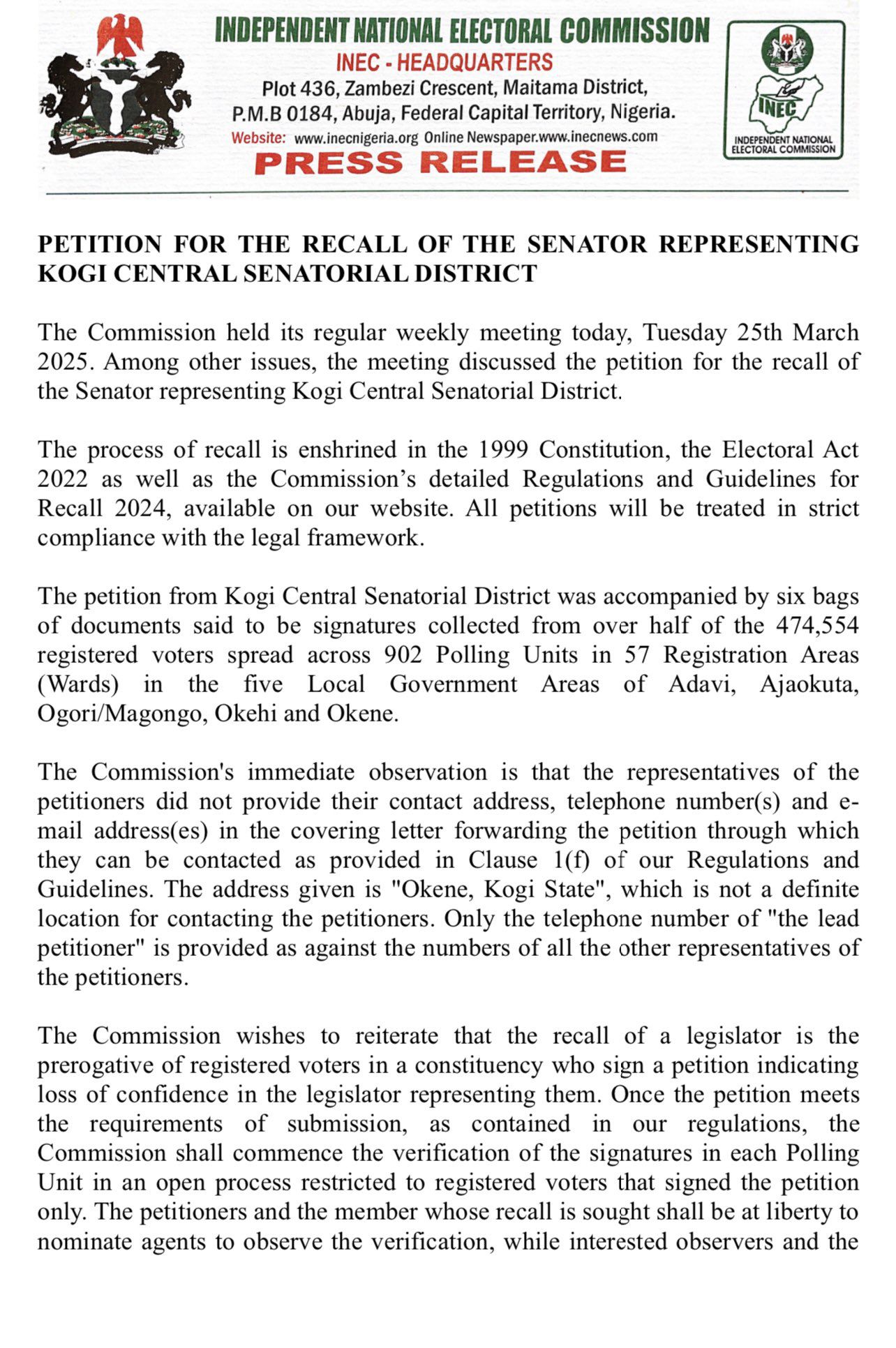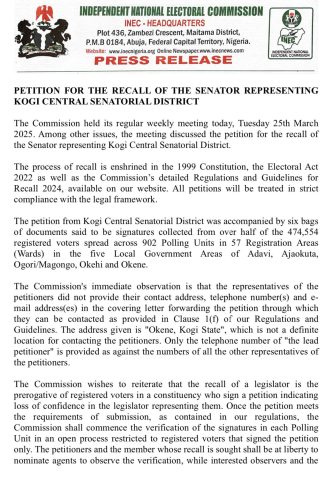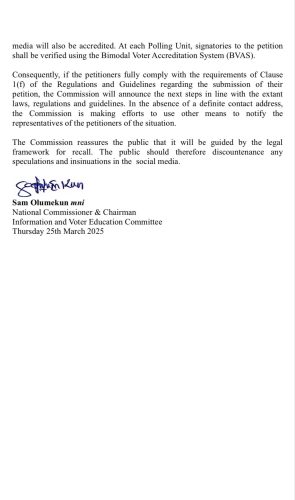NATIONAL NEWS
Natasha’s Recall: Petitioner’s Contact Address, Telephone Numbers, Email Address Missing – INEC
The Independent National Electoral Commission (INEC) has announced that it is making efforts to contact the representatives of the petitioners involved in the recall process of Senator Natasha Akpoti-Uduaghan, who represents Kogi Central Senatorial District. This recall process is outlined in the Constitution and was submitted to the Commission on Monday.

The Independent National Electoral Commission (INEC) has announced that it is making efforts to contact the representatives of the petitioners involved in the recall process of Senator Natasha Akpoti-Uduaghan, who represents Kogi Central Senatorial District. This recall process is outlined in the Constitution and was submitted to the Commission on Monday.
According to INEC, “The process of recall is enshrined in the 1999 Constitution, the Electoral Act 2022, and the Commission’s detailed Regulations and Guidelines for Recall 2024, which are available on our website. All petitions will be treated in strict compliance with the legal framework.”
The petition from Kogi Central Senatorial District was accompanied by six bags of documents that reportedly contain signatures collected from over half of the 474,554 registered voters across 902 polling units in 57 registration areas (wards) within the five local government areas of Adavi, Ajaokuta, Ogori/Magongo, Okehi, and Okene.
In a statement signed by Sam Olumekun, the National Commissioner and Chairman of the Information and Voter Education Committee on Tuesday, March 25, 2025, it was noted that the petition was submitted without any contact address, telephone numbers, or email addresses as required by Clause 1(f) of the Commission’s Regulations and Guidelines. The only address provided was “Okene, Kogi State,” which is not specific enough for contacting the petitioners. Additionally, only the telephone number of the lead petitioner was included, lacking the contact information for other representatives.


INEC emphasized that the recall process is initiated by the registered voters in a constituency, and actions are only taken when the petition meets the submission requirements. The Commission stated that agents will be nominated to observe the verification process at each polling unit using the Bimodal Voter Accreditation System (BVAS).
“The Commission wishes to reiterate that the recall of a legislator is the prerogative of the registered voters in a constituency who sign a petition indicating a loss of confidence in their representative. Once the petition meets the required submission standards, the Commission will initiate the verification of signatures at each polling unit in an open process restricted to the registered voters who signed the petition. Both the petitioners and the legislator facing recall will have the opportunity to nominate agents to observe the verification, while interested observers and members of the media will also be accredited. At each polling unit, the signatories to the petition will be verified using the BVAS.”
The Commission stated that if the petitioners fully comply with the requirements outlined in Clause 1(f) regarding the submission of their petition, it will announce the next steps according to the relevant laws, regulations, and guidelines. Due to the absence of a specific contact address, the Commission is exploring other means to notify the petitioners’ representatives of the situation.
INEC reassures the public that it will adhere to the legal framework for recall. Therefore, the public is urged to disregard any speculation or insinuations circulating on social media.
Newsleverage previously reported that viral images and videos indicated INEC received 240,000 signatures allegedly collected by individuals using a register supposedly from INEC. Further reports from a leaked WhatsApp group suggested the signatures were manipulated allegedly by members of the All Progressive Congress (APC) led by a lecturer at Kogi State University, Charity Ijese, from Kogi West.
For publication of your news content, articles, videos or any other news worthy materials, please send to newsleverage1@gmail.com. For more enquiry, please call +234-706-806-4347 or whatsapp +234-706-806-4347. To place an advert, please call 07068064347.
-

 CRIME1 week ago
CRIME1 week agoPolice Crack Down on IPOB/ESN, Kidnapping Gangs, Arrest Over 2,700 Suspects
-

 NATIONAL NEWS2 weeks ago
NATIONAL NEWS2 weeks agoBreaking! FG Declares Tuesday Public Holiday
-

 METRO4 weeks ago
METRO4 weeks agoAnambra Woman Set Ablaze by Husband Laid to Rest
-

 METRO4 weeks ago
METRO4 weeks agoBREAKING: Pastor Abandons Wife for ‘Spiritual Daughter’
-

 METRO3 weeks ago
METRO3 weeks agoPossible Reason for the U.S. 3-Month Visa for Nigerians







